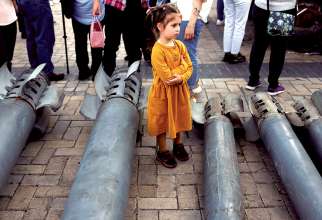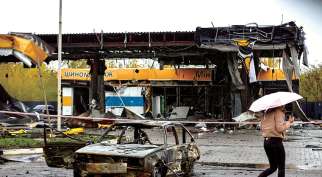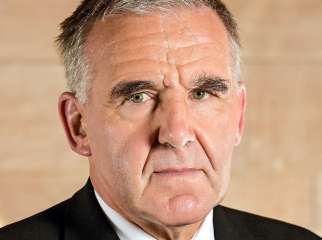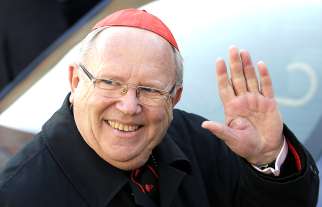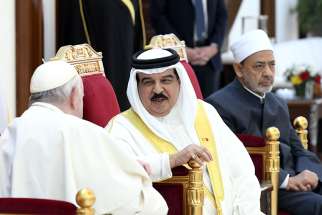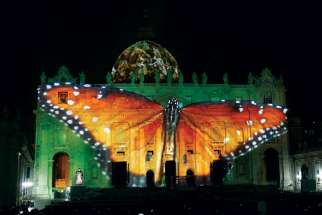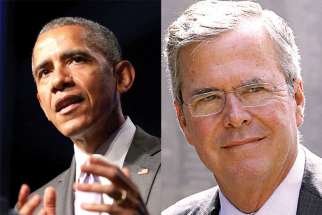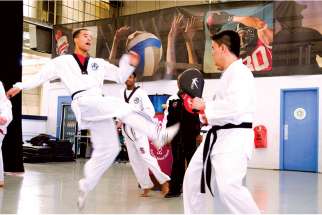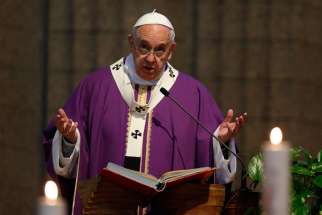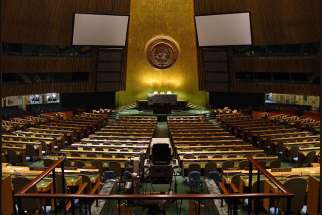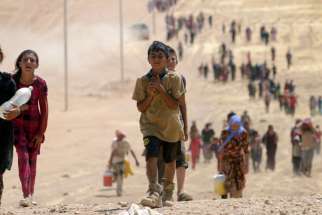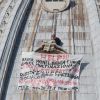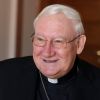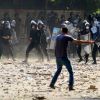Poverty produced by senseless war
War produces tremendous poverty, and its violence strikes those who are defenseless and vulnerable, Pope Francis said.
Ukrainian bishops call for solidarity fast
Canada’s Ukrainian Catholic bishops are asking all Catholics for prayers, charitable giving and three days of fasting Nov. 24 to 26 in solidarity with Ukrainians living with food shortages and facing days without heat, light or water as Russia continues to target civilian infrastructure, especially Ukraine’s power grid.
Pope accepts resignation of German bishop who cheated elderly woman
French cardinal admits to abusing teen girl 35 years ago
AWALI, Bahrain (CNS) -- Traveling as a "sower of peace" to the Kingdom of Bahrain, Pope Francis further strengthened ties with the Muslim world and witnessed the joy and vitality of its minority and predominately expatriate Christian population.
Maybe Pope Francis got his wish.
On Earth Day, April 22, 175 world leaders signed the Paris Accord on climate change — a new one-day record for any international agreement. Fifteen countries immediately ratified it, making it law in those countries.
Reaction from around the world
There are as many opinions on Pope Francis’ encyclical as there are people. Here are a few — both pro and con — from political leaders and media personalities around the world.
Faith helps martial artist succeed on international stage
TORONTO - Having an opportunity to expose Catholic students to the combinination of taekwondo and faith leaves Adam Tomlinson less concerned about securing a spot on Team Canada for this summer’s Pan Am Games.
VATICAN CITY - On International Women's Day, Pope Francis thanked women, "who in thousands of ways, witness to the Gospel and work in the church."
Vatican warns UN against misinterpreting international law, human rights
VATICAN CITY - The Vatican formally criticized a UN committee's "grave misunderstanding" of state sovereignty and reiterated its concerns over "controversial new expressions" that threaten the unborn and religious freedom.
VATICAN CITY - Pope Francis' personal envoy to the suffering people of Iraq joined the Chaldean Catholic patriarch in launching an appeal to the international community Aug. 18, pleading for help to liberate villages controlled by the Islamic State terrorists and to provide the displaced with international protection.
VATICAN CITY - A 49-year-old Italian man protesting the economic policies of Italy and Europe scaled a fence on top of the dome of St. Peter's Basilica Oct. 2 and remained perched above a window for 28 hours, even during Pope Benedict XVI's weekly general audience in the square below.
With the help of two Vatican firefighters and the rope he had tied around himself, the protester, Marcello Di Finizio, climbed back up to the public walkway on top of the dome about 8 p.m. local time. He was escorted to a nearby Italian police station for what he told The Associated Press were "formalities."
Pope Benedict did not mention the protester, Marcello Di Finizio, during his audience talk.
Di Finizio, who had scaled the fence on the dome in July as well, runs a beachfront business in northern Italy, renting umbrellas and chaise lounges. He has been protesting Italy's plan to obey European Union directives by holding public auctions to distribute licenses to operate such businesses on public beaches.
Shortly after the Pope's general audience ended, Catholic News Service reached Di Finizio on his cellphone. Speaking from the dome, he told CNS: "I'm here to ask for help. Our government, our state, doesn't exist. Sectors of the economy, the beach sector, have been paralysed for years by government policies.
"I ask for political asylum from the Vatican," he said. "The Pope is the highest ethical and moral authority in this country, or at least he should be — let's hope he still is."
Di Finizio, who was wearing an Italian flag around his neck, said he would not come down until government officials and labour union officials promised to sit down with him and resolve the serious economic issues facing Italians who work in the tourism sector.
The protester said he felt forced to take his protest public in a highly visible fashion.
"I want to live; I like living," he said, but "if they want to kill me, let them do it in front of millions of people."
Di Finizio implied he could be willing to jump from the dome. When others are driven to such desperate measures, he said, "these are not suicides, these are homicides."
When a CNS reporter suggested that his message had been heard and he could come down, Di Finizio laughed and said: "In your country, maybe that would work, but we're in Italy. Here they will slap me on the back, kick me in the rear and not listen any more."
Then Di Finizio made a request, "Please ask the Pope to send up an electrical cable so that my phone battery doesn't go dead and I can keep talking to (all of) you."
Jesuit Father Federico Lombardi, Vatican spokesman, said Di Finizio obviously was not mentally stable.
Vatican firefighters and police officers remained on the public walkway around the top of St. Peter's dome throughout the night and into Oct. 3 as Di Finizio's protest continued.
Di Finizio had joined a group of tourists going to the top of St. Peter's Basilica at about 5 p.m. Rome time Oct. 2. Security cameras showed him climbing over the 1.5-metre-high fence, tying a rope around himself and lowering himself down to a large decorative overhang above one of the dome's windows. He also managed to unfurl and tie down a large banner to the dome that said "Help!" and called for an end to policies that were "butchering society."
Pope names record number of women, including Canadian, to Synod on Evangelization
VATICAN CITY - Choosing men and women from every part of the world and from a wide variety of professions, Pope Benedict XVI nominated 45 experts and 49 observers for the upcoming world Synod of Bishops.
The Oct. 7-28 gathering will include the largest bloc of women — 10 experts, including Sr. Gill Goulding of Toronto's Regis College, and 19 observers — ever to participate in a Vatican synod.
Europe accounts for the overwhelming majority of the appointees, followed by North America, with 10 people from the United States, two from Mexico and Goulding from Canada. A number of the appointees are also advisors to the Pontifical Council for Promoting New Evangelization and other Vatican offices.
The list of papal appointments to the synod was published Sept. 22 by the Vatican.
Experts and observers, who include laypeople, are not voting members of the synod. According to Vatican rules, only priests, bishops and cardinals can be full members who vote and determine the propositions to be presented to the Pope at the end of the gathering.
The 45 experts include priests, nuns and laypeople, many of whom are professors, rectors or supervisors of catechetical or pastoral programs. They will serve as resources for the more than 200 synod members as they discuss the theme, "New Evangelization for the Transmission of the Christian Faith."
The 49 observers can attend all synod sessions, participate in the synod working groups and have an opportunity to address the entire assembly.
Many of the observers are leaders of religious orders, founders or leaders of lay movements or large Catholic associations, or professors or organizers of catechetical and pastoral programs.
Here is the full list of experts invited to attend the upcoming world Synod of Bishops:
- Sr. Gill Goulding C.J., associate professor of systematic theology and spirituality at Regis College University of Toronto (Canada).
- Sr. Beatriz Acosta Mesa O.D.N. (Colombia), superior general of the Company of Our Lady Mary.
- Mauro Agosto, professor of Latin at Rome's Pontifical Lateran University.- Fr. Anthony Alaba Akinwale O.P., rector of the Dominican Institute of Ibadan (Nigeria).
- Fr. Luiz Alves de Lima S.D.B., member of the administrative office of the Society of Latin American Catechists (Brazil).- Fr. Antonio Aranda Lomena, professor of dogmatic theology at the University of Navarre (Spain).
- Fr. George Augustin S.A.C., professor of fundamental and dogmatic at the "Philosophisch-Theologischen Hochschule Vallendar" (Germany).- Fr. Paul Bere S.J., professor of the Old Testament and biblical languages at the Catholic University of West Africa (Burkina Faso).
- Br. Enzo Bianchi, prior of the monastic community of Bose (Italy).- Br. Enzo Biemmi F.S.F., president of the European Team of Catechists (Italy).
- Fr. Luca Bressan, episcopal vicar for culture, charity, the mission and social work of the archdiocese of Milan (Italy).- Sr. Sara Butler M.S.B.T. (U.S.A.), professor at the Ecclesiastical Faculty of St. Mary of the Lake University in Mundelein, and member of the International Theological Commission.
- Jessica Joy Candelario, coordinator for the pastoral care of young people at "Bukal Ng Tipan Pastoral Centre" (Philippines).- Anna Kai-Yung Chan, professor at the Holy Spirit Seminary College of Theology and Philosophy, Hong Kong (China).
- Sr. Luisa Ciupa S.A.M.I., vice president of the Commission for Catechesis of the Greek-Catholic Ukrainain Church (Ukraine).- Fr. Eamonn Conway, head of the Theology and Religious Studies Department at Mary Immaculate College of the University of Limerick (Ireland).
- Fr. Jeremy Driscoll O.S.B. (U.S.A.), professor at the Theological Faculty of Rome's St. Anselm Pontifical Athenaeum, and professor of liturgy at the Mount Angel Seminary in St. Benedict, Oregon.- Caroline Farey, professor at the Maryvale Institute, Birmingham (England).
- Fr. Juan Javier Flores Arcas O.S.B. (Spain), rector of Rome's St. Anselm Pontifical Athenaeum.
- Msgr. Rafiq Hanna Khoury, professor of liturgy at the major seminary of Beit Jala (Palestinian Territories).- Sr. Anna Emmanuela Klich O.S.U., director of the Inter-Congregational Institute for Catechesis in Krakow (Poland).
- Fr. Jaime Alberto Mancera Casas, episcopal vicar for pastoral care in the archdiocese of Bogota (Colombia).- Msgr. Ermenegildo Manicardi, rector of Rome's "Almo Collegio Capranica", and professor at the Pontifical Biblical Institute (Italy).
- Fr. Thomas Manjaly, professor of Sacred Scripture at Oriens Theological College and at the Inter-Diocesan Theologate for North East India in Shillong (India).- Ralph Martin, director of graduate theological programs in the new evangelisation at the Sacred Heart Seminary of Detroit (U.S.A.).
- Fr. Paolo Martinelli O.F.M. Cap. (Italy), president of the Franciscan Institute of Spirituality at the "Antonianum" Pontifical Athenaeum in Rome, and professor of fundamental theology at the Pontifical Gregorian University in Rome.- Fr. Krzysztof Mielnicki, director of the office for catechesis of the diocese of Drohiczyn (Poland).
- Sr. Paula Jean Miller F.S.E., professor at the Department of Theology of the University of St. Thomas in Huston (U.S.A.).- Fr. Joseph-Marie Ndi-Okalla, vice rector of the "Universite Catholique D'Afrique Centrale" in Yaounde (Cameroon).
- Fr. Godfrey Igwebuike Onah (Nigeria), vice rector of the Pontifical Urban University in Rome.- Rodolfo Papa, professor of art history and aesthetics at the Pontifical Urban University in Rome.
- Fr. Cleto Pavanetto S.D.B., professor emeritus of the Faculty of Christian and Classical Literature at the Pontifical Salesian University of Rome.- Edward Peters, professor of canon law and holder of the Edmund Cardinal Szoka Chair at the Sacred Heart Major Seminary of Detroit (U.S.A.).
- Fr. Salvador Pie-Ninot (Spain), professor of fundamental theology and ecclesiology at the "Facoltat de Teologia de Catalunya", and professor of fundamental theology at the Pontifical Gregorian University in Rome.- Msgr. Antonio Pitta, professor at the Faculty of Theology of Rome's Pontifical Lateran University.
- Sr. Enrica Rosanna F.M.A, former under secretary of the Congregation for Institutes of Consecrated Life and Societies of Apostolic Life (Italy).- Fr. Marko Ivan Rupnik S.J. (Slovenia), director of the "Ezio Aletti" Study Centre in Rome.
- Fr. Samir Khalil Samir S.J. (Lebanon), professor of Arab-Christian theology at the Pontifical Oriental Institute in Rome, and professor of the history of Arabic culture and Islamology at the University of "St. Joseph de Beyrouth".- Fr. Kinkupu Leonard Santedi, professor at the Catholic University of Congo, president of the "Evangelii Nuntiandi" Foundation in Africa, and member of the International Theological Commission (Democratic Republic of Congo).
- Msgr. Pierangelo Sequeri (Italy), president of the Faculty of Theology of Northern Italy, and member of the International Theological Commission.- Thomas Soding, professor of biblical theology at the "Bergische" University of Wuppertal (Germany).
- Fr. Virginio Spicacci S.J., active in pastoral care and evangelisation in the archdiocese of Naples (Italy).- Fr. Mihaly Szentmártoni S.J. (Serbia), president of the Institute of Spirituality of the Pontifical Gregorian University in Rome.
- Fr. Giuseppe Tanzella-Nitti, professor of fundamental theology at the Pontifical University of the Holy Cross in Rome.- Petroc Willey, dean of graduate research at the Maryvale Institute of Birmingham (England).
The Secretary General of the Synod of Bishops has, likewise with the approval of the Supreme Pontiff, appointed the following individuals as "Auditores" (or Auditros) for the forthcoming Synodal Assembly.
- Emile Amin Henein, Director of the "Truth" Centre for Political and Strategic Studies, (Egypt).
- Chiara Amirante, founder and president of the New Horizons Community (Italy).- Carl Albert Anderson (U.S.A.), supreme knight of the Knights of Columbus.
- Fr. Camilo Bernal Hadad C.I.M. (Colombia), superior general of the Congregation of Jesus and Mary.- Sr. Maria Antonieta Bruscato F.S.P. (Brazil), superior general of the Daughters of St. Paul.
- Guzman Carriquiry (Uruguay), secretary of the Pontifical Commission for Latin America.- Jose Maria Simon Castellví (Spain), president of the International Federation of the Association of Catholic Media F.I.A.M.C.
- Sr. Rekha (Mary Joseph) Chennattu R.A., professor of the New Testament at the Pontifical Institute of Philosophy and Religion in Pune (India).- Fr. Renato de Guzman S.D.B., chief assistant for pastoral care of the Grade School and High School Departments, Don Bosco Technical Institute in Makati City (Philippines).
- Florence De Leyritz, member of the Alpha France Association (France).- Marc De Leyritz, president of the Alpha France Association (France).
- Fr. Ari Luis do Valle Ribeiro, professor at the seminar of the diocese of Santo Amaro, and diocesan coordinator for catechesis (Brazil).- Mikhail Fateev, director of production at the "United Television" channel of St. Petersburg (Russian Federation).
- Sr. Inmaculada Fukasawa A.C.I. (Japan), superior general of the Handmaidens of the Sacred Heart of Jesus- Msgr. Enrique Glennie Graue, vicar general of the archdiocese of Mexico (Mexico).
- Francisco Jose Gomez Arguello Wirtz (Spain), co-founder of the Neo-Catechumenal Way.- Fr. Jesus Higueras Esteban, pastor of S. Maria de Cana, Madrid (Spain).
- Marco Impagliazzo (Italy), president of the Sant'Egidio Community.- Lydia Jimenez Gonzalez (Spain), director general of the "Cruzadas de Santa Maria" Secular Institute.
- Ernestine Sikujua Kinyabuuma, professor at the University Institute of Maria Malkia in Lubumbashi, and member of the "Focolari" Movement (Democratic Republic of Congo).- Joakim Kipyego Koech, head of the Communion and Liberation Movement in Kenya.
- Zoltan Kunszabo, permanent deacon of the archdiocese of Esztergom-Budapest (Hungary).- Ewa Kusz (Poland), former president of the World Conference of Secular Institutes, C.M.I.S.
- Chantal Le Ricque, lay woman of the archdiocese of Paris (France).- Fr. Vinko Mamic O.C.D., president of the Union of Superiors Major in Croatia (Croatia).
- Curtis A. Martin, founder and president of the Fellowship of Catholic University Students - Focus (U.S.A.).- Salvatore Martinez, president for Italy of the Renewal in the Holy Spirit Movement (Italy).
- Sr. Nzenzili Lucie Mboma F.M.M. (Democratic Republic of Congo), executive director of the Service of Documentation and Study on Global Mission, S.E.D.O.S.- Marylee J. Meehan (U.S.A.), president of the International Catholic Committee of Nurses and Medico-Social Assistants, C.I.C.I.A.M.S.
- Franco Miano, president of Italian Catholic Action.- Gisele Muchati, regional director of the New Families Movement (Syria).
- Peter Murphy, executive director of the Secretariat for Evangelisation and Catechesis of the United States Conference of Catholic Bishops (U.S.A.).- Patricia Ngozi Nwachukwu K.S.M., member of the Knights of St. Mulumba (Nigeria).
- Yong Suk Francis Xavier Oh, secretary general of the Catholic Lay Apostolate Council of Korea (Korea).- Fr. Piergiorgio Perini, president of the International Service Organisation for the "Cellule Parrocchiali di Evangelizzazione" (Italy).
- Rita María Petrirena Hernandez, head of the department for pastoral coordination of the Conference of Catholic Bishops of Cuba (Cuba).- Sr. Suzanne Louise Phillips F.M.M. (Australia), superior general of the Franciscan Missionary Sisters of Mary.
- Sr. Mary Prema Pierick M.C. (India), superior general of the Missionaries of Charity.- Jose Prado Flores, founder and international director of the St. Andrew Schools of Evangelisation (Mexico).
- Sr. Yvonne Reungoat F.M.A. (France), superior general of the Daughters of Mary Help of Christians, Salesian Sisters of St John Bosco. - Br. Alvaro Antonio Rodriguez Echeverria F.S.C. (Costa Rica), superior general of the Brothers of Christian Schools.
- Michel Roy (France), secretary general of "Caritas Internationalis".- Raid Sargi, president of the Society of St. Vincent de Paul in Damascus (Syria).
- Tommaso Spinelli, catechist of the youth group of the parish of Santa Melania Juniore in Rome.- Manoj Sunny, director and journalist, founding member of the Jesus Youth Movement (India).
- Br. Emili Turu Rofes F.M.S. (Spain), superior general of the Marist Brothers (Little Brothers of Mary).- Fr. Emmanuel Typamm C.M. (Cameroon), secretary general of the "Confederation des Conferences des Superieurs Majeurs D'Afrique et de Madagascar", Co.S.M.A.M.
- Maria Voce (Italy), president of the Focolari Movement.- Sr. Mary Lou Wirtz F.C.J.M. (U.S.A.), president of the International Union of Superiors General, U.I.S.G.
Vatican synod to examine when divided Christians can preach together
VATICAN CITY - The potential power, but also the limits, of an ecumenical proclamation of the Gospel and defense of Gospel values is likely to be a key topic during October's world Synod of Bishops on the new evangelization.
The ecumenical focus will be particularly sharp Oct. 10 when — at the personal invitation of Pope Benedict XVI — Anglican Archbishop Rowan Williams of Canterbury will deliver a major address to synod members.
While popes have long invited other Christians to be "fraternal delegates" and make brief speeches at the synods, Pope Benedict has begun a tradition of inviting important religious leaders to deliver a major address. In 2008, Orthodox Ecumenical Patriarch Bartholomew of Constantinople and Chief Rabbi Shear-Yashuv Cohen of Haifa, Israel, addressed the Synod of Bishops on the Bible. Another rabbi and two Muslim leaders gave speeches at the 2010 special synod on the Middle East.
Bishop Brian Farrell, secretary of the Pontifical Council for Promoting Christian Unity, said the invitations demonstrate the Pope's recognition that the "challenges facing religious belief itself and Church life are common — no Church, no religion is an island — and we need one another and can learn from one another."
In addition, he said, ecumenical and interreligious co-operation shows the world that "we are together in promoting the values of belief and the moral-ethical values that we stand by."
Ecumenical co-operation is crucial when trying to transmit the faith in the modern world and to re-propose Christianity in areas, especially Europe and North America, which had a Christian tradition, but are becoming increasingly secularized.
"The mission that the Lord entrusted to the Apostles, to preach the Gospel to the ends of the Earth, has not been fulfilled — mostly because of divisions among His followers," Farrell said.
The beginnings of the modern ecumenical movement usually are traced to a 1910 conference of missionaries "who had the experience of being seen as preaching against each other instead of preaching Christ," he said. The missionaries recognized the scandal they were causing as they "exported their divisions" to Asia, Africa and other parts of the world.
The missionaries saw "their work being undermined by their own divisions," which they increasingly acknowledged were violations of the will of Jesus that His followers be one, the bishop said.
Meanwhile, among some Catholics in the early 1900s, "there were the beginnings of a spiritual interest in the idea of prayer for Christian unity," he said, but the quantum leap in the Catholic Church's commitment to ecumenism came with the 1962-65 Second Vatican Council.
Farrell said the change in the Church's attitude reflected an "education of the bishops at the council, because most of the bishops came with the kind of theology that considered our Protestant brothers and sisters, and the Orthodox to a certain degree, as just outside the Church."
Through discussions and studies at the council, he said, the bishops gained "a new perspective: We have a common faith in Jesus Christ, we have a common baptism, and this is already a huge element of real communion in the faith."
The ecumenical task, embraced by the Catholic Church, involves prayer and dialogue to move that communion "from imperfect to perfect," he said. Until the process is complete, however, there will be some limits to the possibilities for ecumenical co-operation in evangelization, because Catholics, Orthodox, Anglicans and other mainline Christians aren't just inviting people to profess faith in Jesus Christ, but to live that faith in His body, the Church.
"There is a kind of superficial ecumenism that says, 'it doesn't matter what Church you belong to,'" Farrell said, but the Catholic Church and most of its dialogue partners reject that view.
Because Christians aren't passing on "some Gospel of their own making," but a faith they have received, "sharing one's faith means sharing one's belonging to a particular community that has given me that faith. It means sharing the conviction, in conscience, that the Gospel comes to me in its fullness in this particular community," the bishop said.
The role of the Church and, in fact, the definition of what it means to be fully Church is at the heart of the ongoing, sometimes difficult, theological ecumenical dialogues, he said.
For the Catholic Church, Farrell said, "We can't work for a common minimum denominator; nor can we say, 'let's keep our differences and just accept one another as we are.'
"We have to aim at whatever is required for the fullness of incorporation into Christ and into the one Church He founded. But where is that Church? That is the question that will trouble us until Christian disunity becomes Christian unity: not uniformity, but true, grace-filled communion in faith and Christian living."
Anti-Islam film unsettles Muslims, while making Christians targets
CAIRO - As tear-gas-bearing police battled Egyptians armed with stones in front of Cairo's U.S. Embassy, Rashad was two neighbourhoods away, making sure the few evening customers respected the line at the Mobinil cellphone company where he works.
"Is it all right to defame the Prophet, blessings be upon him?" Rashad, a Muslim, asked a reporter who inquired about the embassy standoff. "No. There are limits to how far people should be allowed to go."
Rashad, who would not give his last name, had not seen the amateur film reportedly defaming the prophet Mohammed that led to protests at the U.S. embassies in Egypt and other countries. But he said he'd heard enough to know that the film was "haram," or sinful, and that protests against it, however violent, were justified.
Such anger over the film that depicted Mohammed as a sex-crazed simpleton has Egypt's Christians — and others in predominantly Muslim countries — worried. They say the film's association with the Christian West makes them possible targets of extremist behaviour.
"What happens outside the country is very dangerous for us because it is perceived to be related to us inside," said Bishop Adel Zaki of Alexandria, Egypt's vicar for Latin-rite Catholics.
The film was released in July but went almost completely unnoticed in the Middle East until a preview of it was translated into Arabic.
In an interview at his Cairo residence, Zaki told Catholic News Service that Egypt's Catholics condemned defamation of other religions, in line with what he called "the Vatican decree which commands respect for those of other faiths." But when products or policies deemed anti-Arab or anti-Muslim surface in the United States and other Western countries, Egypt's Christians, who account for about eight million of the country's more than 82 million people, often feel the brunt, he said.
People in other countries "should keep in mind that there are repercussions for Christians here. The level of fanaticism grows," he said.
Newly elected Egyptian President Mohammed Morsi, a conservative Muslim, has decried the short film, saying "Egyptians reject any kind of insult against our Prophet." But he also called for restraint and protection of the country's "foreign guests" and embassies.
Despite the tension over the film in Cairo and other parts of the Middle East, Fr. Fady Sady, a Coptic Catholic priest, said he did not expect trouble in Egypt's South, where he lives and serves.
"(Muslims) know those who made the film are not from Egypt, so there will be no problems," he said by cellphone from the city of Nagada. But he added that "when anything contentious" like this film appears abroad, Christians in Egypt go on alert.
"Perhaps someone not very educated could use the event to make an operation," he said, referring to attacks on churches that have occurred in the past.
Back in Cairo, Mohammed Abdu, a 22-year-old Muslim taxi driver, said he was angered by reports of the film but even more upset by the protests at the U.S. Embassy. He said he expected they would further damage Egypt's economy, already facing huge challenges due to dramatic losses in tourism and other business since the 2011 overthrow of former President Hosni Mubarak's authoritarian regime.
"Had (the protesters) been quiet and ignored (the film), it would have disappeared, but now it is famous. When people start climbing walls and attacking embassies, the people who made the film get the attention they wanted," said Abdu, who drives a rented cab 12 hours a day to save enough money to get married. He said he projected even less income for the country now and, consequently, fewer people with money to ride cabs like his.
Internationally, religious leaders from across the spectrum were quick to condemn the hate message of the anti-Islam film and the wave of violent attack it provoked. In a Sept. 11 attack, the U.S. ambassador to Libya, three other Americans and several Libyan soldiers were killed in the consulate in Benghazi, Libya.
The next day, the Vatican condemned the attacks, saying there was no justification for such violence.
After protests in Pakistan gathered momentum, Catholic leaders in Faisalabad condemned the film. A Church official said leaders hoped to avoid possible anti-Christian backlash.
Israeli and Palestinian leaders who work with religious institutions as well as heads of local churches issued a joint statement Sept. 15 deploring "those who abuse free speech to offend the religion and religious beliefs and symbols of others." The leaders also condemned "those who use violence in reaction instead of peacefully protesting against such abuse."
Israeli Deputy Foreign Ministry spokesman Paul Hirschson told the Hebrew edition of Ha'aretz daily newspaper that the content of the film was "beneath contempt" and "vile."
Leaders of the Coptic Orthodox archdiocese of North America expressed sympathy to the families of those killed in Libya and emphasized that such violence contradicted "the virtues of love and tolerance by which Christians are governed." They also rejected allegations that the Coptic Orthodox community was involved in producing the film.


